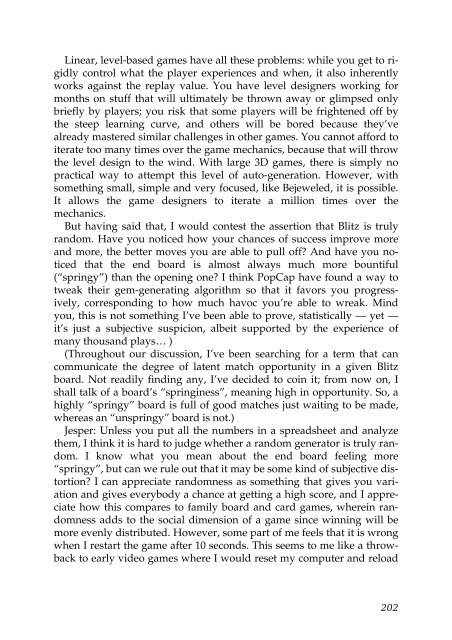Well Played 2.0: Video Games, Value and Meaning - OpenLibra
Well Played 2.0: Video Games, Value and Meaning - OpenLibra
Well Played 2.0: Video Games, Value and Meaning - OpenLibra
You also want an ePaper? Increase the reach of your titles
YUMPU automatically turns print PDFs into web optimized ePapers that Google loves.
Linear, level-based games have all these problems: while you get to rigidly<br />
control what the player experiences <strong>and</strong> when, it also inherently<br />
works against the replay value. You have level designers working for<br />
months on stuff that will ultimately be thrown away or glimpsed only<br />
briefly by players; you risk that some players will be frightened off by<br />
the steep learning curve, <strong>and</strong> others will be bored because they’ve<br />
already mastered similar challenges in other games. You cannot afford to<br />
iterate too many times over the game mechanics, because that will throw<br />
the level design to the wind. With large 3D games, there is simply no<br />
practical way to attempt this level of auto-generation. However, with<br />
something small, simple <strong>and</strong> very focused, like Bejeweled, it is possible.<br />
It allows the game designers to iterate a million times over the<br />
mechanics.<br />
But having said that, I would contest the assertion that Blitz is truly<br />
r<strong>and</strong>om. Have you noticed how your chances of success improve more<br />
<strong>and</strong> more, the better moves you are able to pull off? And have you noticed<br />
that the end board is almost always much more bountiful<br />
(“springy”) than the opening one? I think PopCap have found a way to<br />
tweak their gem-generating algorithm so that it favors you progressively,<br />
corresponding to how much havoc you’re able to wreak. Mind<br />
you, this is not something I’ve been able to prove, statistically — yet —<br />
it’s just a subjective suspicion, albeit supported by the experience of<br />
many thous<strong>and</strong> plays… )<br />
(Throughout our discussion, I’ve been searching for a term that can<br />
communicate the degree of latent match opportunity in a given Blitz<br />
board. Not readily finding any, I’ve decided to coin it; from now on, I<br />
shall talk of a board’s “springiness”, meaning high in opportunity. So, a<br />
highly “springy” board is full of good matches just waiting to be made,<br />
whereas an “unspringy” board is not.)<br />
Jesper: Unless you put all the numbers in a spreadsheet <strong>and</strong> analyze<br />
them, I think it is hard to judge whether a r<strong>and</strong>om generator is truly r<strong>and</strong>om.<br />
I know what you mean about the end board feeling more<br />
“springy”, but can we rule out that it may be some kind of subjective distortion?<br />
I can appreciate r<strong>and</strong>omness as something that gives you variation<br />
<strong>and</strong> gives everybody a chance at getting a high score, <strong>and</strong> I appreciate<br />
how this compares to family board <strong>and</strong> card games, wherein r<strong>and</strong>omness<br />
adds to the social dimension of a game since winning will be<br />
more evenly distributed. However, some part of me feels that it is wrong<br />
when I restart the game after 10 seconds. This seems to me like a throwback<br />
to early video games where I would reset my computer <strong>and</strong> reload<br />
202

















